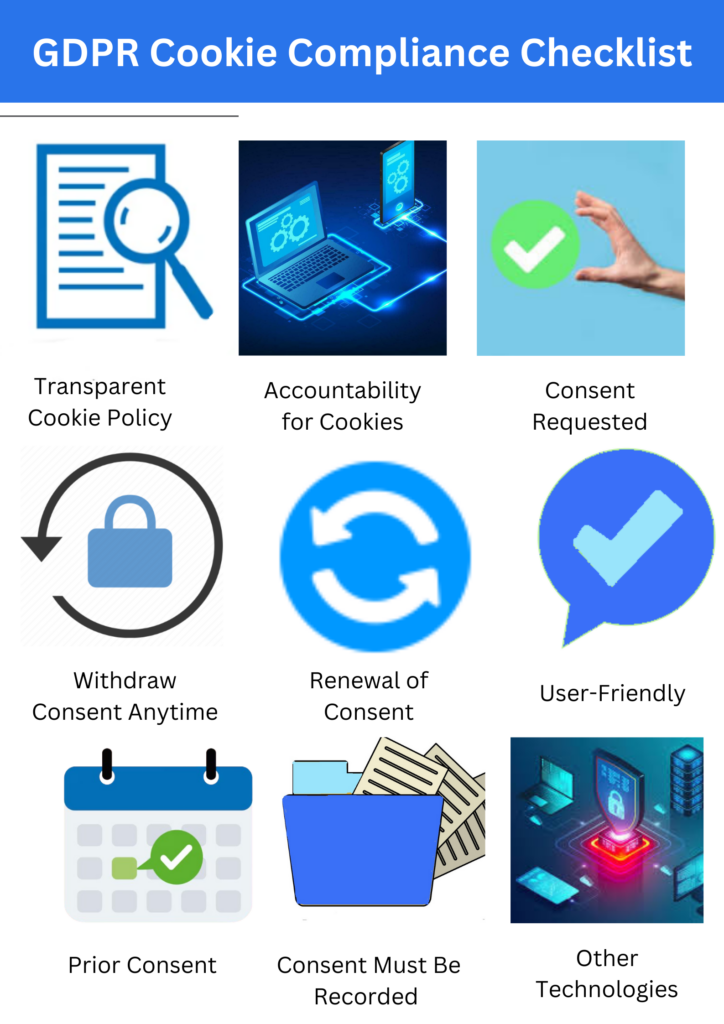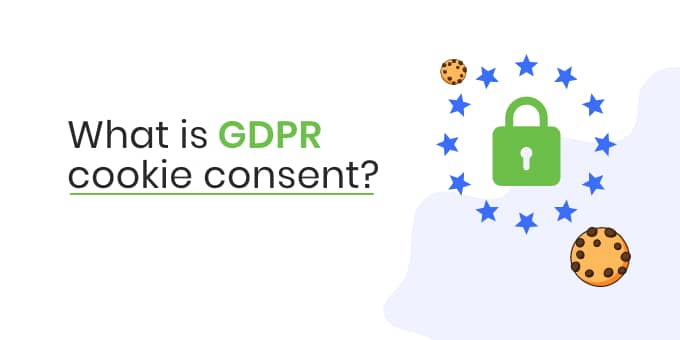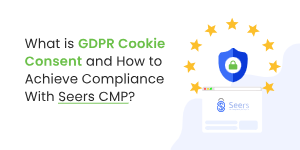Take a minute from your busy routine to check whether you know the cookie consent requirements under the General Data Protection Regulation (GDPR) law. Do you respect the privacy of your users as a business or website owner? Have you specified terms and conditions and a privacy policy for your consumers?
Well, I guess it’s time to become aware of the importance of protecting personal data, so let’s get started. GDPR cookies are regarding security checks.
Do you know what cookies are?
Cookies are small files automatically dropped on your computer when browsing the web. They store harmless bits of text locally, allowing you to view and delete them quickly.
However, they give great insight into a user’s activity and preferences. They tend to identify a user without explicit content.
“From a legal point of view, it indicates a data breach. Therefore, there are more chances that a user’s privacy can be compromised.”
Overlooking other technologies
The legal requirements under GDPR are not only limited to cookies. While several privacy lobbies and solutions focus entirely on cookies, there is a lot more to the overall compliance strategy required of your business. Cookie consent GDPR is essential in this regard.
Other technologies that also need similar regulation include tags, beacons, pixels, scripts, and more. These may track users’ data for similar reasons to the use of cookies.
This may consist of collecting and sorting marketing data, consumer information, contact and behavioural data, etc.
The same law applies to these technologies as to the use of cookies. Here’s what each of these entails:
| Technology | Definition | Function | Privacy Risks | Consent and Compliance |
|---|---|---|---|---|
| Tags | Small labels attached to user data. | Sifts and analyzes data by dividing it into marketable segments. | Data segmentation must be consensual, transparently obtained, and not abused. | Must be obtained transparently; requires a consent management platform. |
| Beacons | Technology enables mobile apps to understand users’ geographic locations. | Delivers relevant content based on the user’s immediate environment. | The Collection and use of geographic data can compromise user privacy. | Must be used with user permission and in line with GDPR. |
| Pixels | Marketers use this tool to collect and track user data and website performance. | Tracks user data and website performance to measure advertising effectiveness. | Provides deep user insights, potentially leading to excessive tracking and targeted ads. | Requires GDPR compliance by obtaining and registering informed consent. |
| Scripts | Pieces of Javascript code that record user activity on websites. | Logs user movements, keywords, clicks, and scrolls. | Requires transparency and careful handling. | Privacy watchdogs stress the need for transparent, consensual, and careful handling of scripts to |
GDPR and cookie compliance
Cookies and User Identification:
- Most cookies identify users, though not all of them do.
- Cookies related to analytics, advertising, and functional services identify users.
- These cookies are subject to GDPR.
User Privacy Concerns:
- You need to inform users about what personal data is linked to them during registration.
- They should be informed about:
- Data Tracking: Who is tracking their data?
- Purpose: The core purpose of monitoring their personal data.
- Data Flow: Where their data is sent and stored.
- Storage Duration: How long their personal data is stored.
GDPR Compliance:
- A GDPR-compliant consent management solution should address these privacy concerns and ensure transparency.
Understanding what constitutes a GDPR-compliant consent management platform is essential.
Consent obtained
The consent obtained must be
- Understanding what constitutes a GDPR-compliant consent management platform is essential. The consent obtained must be:
- The consent must be given through affirmative action, which cannot be interpreted.
- The consent must be given for the initial processing of personal data.
- The consent must be accessible to the user to withdraw if a user changes their mind.
- All personal data must be appropriately deleted at the user’s request under the “right to forget.”
- Consent should be tracked and recorded in the documentation.
Handling Additional Technologies
- Beyond Cookies: In addition to cookies, you must handle tracking devices such as tags, beacons, pixels, and scripts.
- Implied Consent Issues: Using implied consent for only cookies is insufficient; every technology used and placed by your website on the user’s devices needs consideration.
Seers Consent Management Platform
- Solution: A proper and comprehensively compliant consent management platform is essential. Consider trying the Seers Consent Management Platform to start your seamless compliance journey in the domain.
GDPR-compliant cookie policy
Under the GDPR cookie consent, all businesses operating in the EU or dealing with EU citizens must revise their cookie policy to comply with the regulation.
Organisations must obtain prior and informed consent from their website users and register this consent as per the GDPR.In other words, you must know what user data you share with third-party services on your website and where you send the information.
A GDPR cookie compliance policy must fulfil the following requirements.

1) Transparent cookie policy
Ensure your GDPR cookie policy gives website users a clear and explicit picture. You must write it in clear, plain, and easy-to-understand language.
2) Accountability for cookies on your website
You must control and account for the data processes happening on your website. This is more challenging than it appears because most sites have many third-party cookies flowing through their system.
3) Consent requested through an affirmative action
This is the most significant change for cookies and online tracking. EU citizens have grown accustomed to banners on every website that states the use of cookies. Sometimes, they ask you to check the OK button but do not provide users with specific options.
The regulation asserts that more is needed. Consent should be given through affirmative and positive action. Moreover, an option for rejecting cookies should also be provided.
4) To withdraw the consent at any time
You must give the user the power to withdraw consent at any time. You must ensure your users can access their current consent state and know how to withdraw their consent.
5) Renewal of consent
The renewal of consent for cookies is not an issue, and the guidance indicates that the duration of consent should be reasonable. It also impacts changes to cookies or similar technology that tracks user behaviour.
6) User-friendly, no-nonsense dialogue
There are two obligations for website owners under the GDPR:
- You should ensure the cookie consent is transparent, and users must understand how their data is used.
- The communication should be understandable so the user can make a valid choice.
7) Prior consent
General Data Protection Regulation (GDPR) and the ePrivacy Directive state that a user’s consent must be given before browsing a website. Under GDPR, you must obtain prior permission to set cookies that track personal data.
However, the ePrivacy Directive requires that you obtain consent to put all but the strictly necessary cookies.
8) Consent must be recorded as evidence
You must store every user’s consent securely because it can indicate a data breach or loss of control over data within an organisation.
9) Cover other technologies too
You should note the use and placement of all other technologies on top of the cookies used everywhere possible, including, but not limited to, the cookie banner and the accompanying cookie policy.
Why is privacy important?
- Privacy rights are extensive and detailed, making it crucial for businesses to respect and uphold all users’ rights.
- Ensuring complete legal compliance with privacy and data protection laws is essential for businesses.
User Rights:
- Users have specific rights regarding how their data is processed.
- Businesses must respond to any data requests promptly, typically within one month.
- Businesses must honour the right to erasure and provide complete or adequate representation.
- Rights to expression and representation should not be rejected or denied.
Right to Privacy:
- Privacy is not just a civil right; it encompasses security, wellness, and user protection.
- The Geneva Convention and various human rights charters recognise privacy rights.
UK Specific Information:
- Users in the UK who believe a business is not respecting their privacy rights can report the company to the Information Commissioner’s Office (ICO).
Privileges
Users may also enjoy extended privileges, such as being able to request
- For a copy of personal data, the business may be processing them and have inaccuracies corrected;
- To restrict, stop processing, or to delete their data;
- For a machine-readable copy of their personal data, which they can use with another service provider. Where it is technically feasible, they can ask the business to send this information directly to another provider if they prefer, and
- To make a complaint to a data protection regulator. Thus, the best level of compliance must be implemented at all times.
Google Consent Mode (GDPR cookie consent)
On September 3, 2020, Google launched its new Google Consent Mode, enhancing GDPR and cookies compliance. This ground-breaking new feature within the Google Platform makes consent the defining condition for how their services—Google Analytics and Google Ads—run on the user’s devices. Complying with the terms is essential, or marketing will no longer permit progress.
Seers Consent Management Platform
With the fully compliant Seers Consent Management Platform, you can plug and play GDPR Cookie consent for your website. It allows its globally acclaimed and leading cookie scanner and consent management technology to supervise the use and functionality of the services while ensuring user consent and legal compliance.
Seers offers new tag settings to run Google services based on your end-user’s consent. It can also aggregate non-identifying data if users do not consent to statistics cookies.
Impact of Consent Mode
The Consent Mode also means that Google will display contextual ads instead of targeted ads if users do not consent to marketing cookies in their consent provision. This shows that the leading tech companies are working tirelessly to ensure the security and safety of user privacy as per data privacy regulations worldwide (GDPR cookies).
The Seers CMP
Seers can save your business from non-compliance with data privacy regulations globally, including GDPR, PECR, CCPA and LGPD. Non-compliance with data privacy regulations can result in hefty fines of up to €20 Million or 4% of the company’s global annual turnover (whichever is higher) and loss of reputation and business. And yet, three out of 4 European
Current Compliance Challenges for SMEs
SMEs are currently not compliant with data privacy regulations (source: International Association of Privacy Professionals (IAPP).
Seers Consent Management Platform (CMP) Capabilities
The Seers CMP can handle tracking technologies, including cookies, pixels, tags, beacons, scripts, etc. It complies entirely with global data privacy regulations, including GDPR, PECR, CCPA & LGPD, as opposed to several other popular but not genuinely comprehensive solutions, like the Seers CMP.
Risks of Non-Compliance
The average website places 34 cookies or tracking technologies on a user’s device on the first visit, and 70% are third-party cookies. Security vulnerabilities may allow hackers to read cookies and other tracking technology data, increasing the chances of litigation and fines. To avoid such a case where your business is in serious legal trouble, you can implement the Seers CMP today!
Frequently Asked Questions (FAQs)
1) How does the GDPR cookies consent work?
By default, our cookie plugin blocks all the cookies until and unless a user clicks on the “I accept” button in the consent pop-up. Only then a user can enable different services in the privacy setting. (GDPR cookies)
2) Define GDPR cookies consent?
The General Data Protection Regulation (GDPR) and ePrivacy Directive impacts how website owners obtain and store cookie consent from their EU visitors.
3) Who enforces cookie compliance?
The Information Commissioner Office (ICO) enforces cookie compliance in the UK under the GDPR. Whereas, other member states expect to have designated authority enforcement of the cookie law. In many cases, it is the local Data Protection authority. But sometimes it is a telecoms regulator or a business regulation organisation who enforces compliance.
4) Why is it crucial to comply with the EU cookie law?
The website can face a penalty of approximately £500,000. Compliance is a way to meet visitors’ expectations and to show respect for his or her privacy preferences. In no time, it will become a key business driver for all website owners. (GDPR cookies)
5) Is my site 100% GDPR compliant after installing the cookie plugin?
No, but it provides you with many tools to look after most of the features required under GDPR. To achieve 100% compliance, you must contact a legal advisor to improve your situation.
6) How can I obtain the Seers Consent Management Platform and what does it cover?
Seers world’s leading Consent Management Platform is available here
It covers:
Firstly, Cookie audit or scan – to discover what cookies you are running on your website. And what do you need to do to become compliant.
Seers world’s leading Consent Management Platform is available here
Secondly, Cookie policy – a legal draft fully compliant cookie policy that includes a unique “automatically updating” cookie table update via HTML script that place on your website which ensures that you are compliant at all times.
Thirdly, Cookie banner – provides explicit prior consent, periodic website scan to update cookie policy, covers different jurisdictions for different users. And lastly, auto-generates cookie policy and regular updates.


